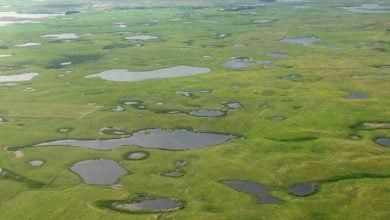The Mississippi River floods in April
and May are among the largest and most damaging in the past century.
The flooding resulted from weeks of heavy rains in addition to
unusually high amounts of snow, leading to record water levels in the
river and many tributaries by early May. As is the case in all
disasters of this magnitude, poor people experience the greatest
impact.
Areas along the Mississippi that have
been flooded include Illinois, Missouri, Kentucky, Tennessee,
Arkansas, Mississippi, and Louisiana. Many areas have been declared
federal disaster areas.
According to the Census, one in five
people in the state of Mississippi lives in poverty. Many lack
insurance and have nowhere to go when ordered to evacuate. So
children play in the floodwater while adults wonder when or if any
help will come: “At this moment, no help right
now. It might be later coming on. But not right now. We ain’t getting
no help,” said David Henderson of Vicksburg, Miss. (Associated
Press, May 18)
Some communities are so poor they do
not have a newspaper or a TV station to warn them about flooding.
Some residents lack electricity. Officials have had to scramble to
inform these residents of the impending danger.
Morganza Spillway opening floods poor
communities
For the first time in 37 years, the
Morganza Spillway has been opened, deliberately flooding 4,600 square
miles of rural Louisiana to prevent flooding in the much more densely
populated cities of Baton Rouge and New Orleans.
The May 14 opening of the Morganza
Spillway—the largest spillway in the world—just north of Baton
Rouge has resulted in the intentional flooding of historic Cajun
communities.
Four gates are open now at the
spillway. Just one releases nearly 75,000 gallons per second, 4.5
million gallons per minute, a rate that would fill an Olympic-sized
pool in nine seconds
The towns of Kotz, Butte LaRose and
Morgan City are expected to be flooded with as much as 20 feet of
water. Most of the region is farm land and bayous. People from the
region are now being evacuated. The Cajun people who live in these
towns still maintain their own distinct culture and language. Cajuns
have historically been treated as second-class citizens in Louisiana.
Many Cajun communities have been impoverished, despite the immense
amount of natural wealth surrounding them. Thus there is the
perception that Cajun communities are being sacrificed by the
intentional flooding.
Although such severe flooding has not
taken place in decades, residents in the area receive yearly warnings
of the possibility of flooding. Most homeowners in the region cannot
get flood insurance, but are eligible for the National Flood
Insurance Program—but now it is too late to enroll.
NFIP coverage is an agreement between
communities and the federal government to provide coverage—with
interest if there is a payout—if a plan is in place for flood
waters to be diverted into a floodplain or areas adjacent to a river
at risk of flooding. However, the responsibility for having the plan
is on the individual communities, rather than a comprehensive plan
for all communities along the Mississippi River.
In other words, poor communities unable
to develop their own plan are at higher risk of suffering from
extreme flooding.
Global Warming linked to flooding
“Climate science tells us
unambiguously that we’re changing the climate, and we’re trapping
more energy in the atmosphere. We know that trapping more energy will
cause more extreme events and will worsen extreme events that would
otherwise happen” says Dr. Peter Gleick of the Pacific Institute.
Many prominent scientists have warned
that global warming would create conditions of extreme climatic
events, such as large amounts of rain and floods.
“Louisiana has 30 percent of the
total coastal marsh in the continental United States and accounts for
90 percent of the coastal marsh loss. It loses a football field’s
worth of wetlands every 45 to 60 minutes,” according to journalist
Barry Yeoman in his series “Losing Louisiana”.
Under capitalism the Mississippi River
has been engineered in the interest of profits without any regard for
the possibility of flooding or the loss of wetlands. The diminished
wetlands along the coast worsened the effects of the 2010 BP Oil
disaster in the Gulf of Mexico. Barataria Bay, just south of the
region being flooded, is an important nesting area for Louisiana’s
pelicans—and was one of the most polluted areas from the BP spill.
However, the wetlands are also
suffering due to a dramatic rise in sea-level associated with global
warming. The sea-level rise in the Gulf Coast is occurring at a rate
five times faster than it did in the 1,000 years preceding the
Industrial Revolution, according to Professor Oliver Houck, director
of Tulane University’s Environmental Law Program.
Under a workers’ government, plans
would be immediately initiated to re-engineer the Misssissippi River
so that needed sediment and fresh water reaches the bayous, and to
repair damage done by oil companies digging canals through fragile
wetlands. Such plans would not disadvantage any community.
Comrehensive planning would take care of all communities in the event
of floods or other natural disaster, the way Cuba takes care of its
people during hurricanes. Finally, steps would be taken to stop the
effects of global warming caused by unbridled capitalism seeking
industrial development solutions that do not destroy the planet.






